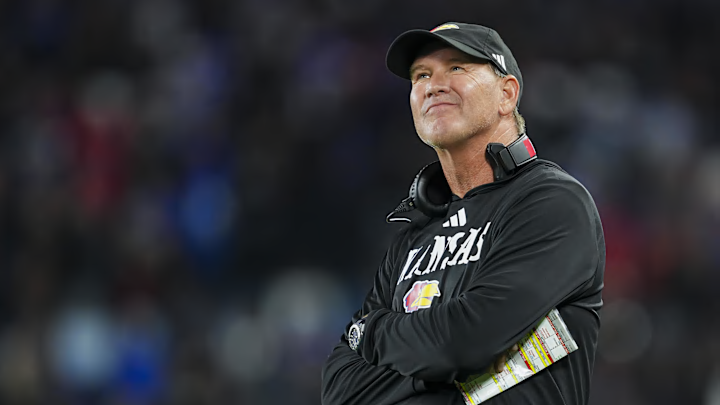On Saturday, the Kansas Jayhawks dropped their third straight game in what has now become a mind-boggling season for a team that was preseason top 25 in the country with real aspirations of competing for the school’s first Big 12 Championship and potentially claiming a spot in the College Football Playoff.
Kansas had an 11-point lead over West Virginia (28-17) with less than six minutes to play in the fourth quarter in Morgantown before allowing back-to-back touchdown drives to lose the game.
It’s the third straight week in which KU has held a lead in the fourth quarter and ended up losing. KU was up four with less than two minutes left against UNLV and was up four against Illinois with just under 10 minutes left in the game.
While the losses obviously put a damper on this season’s hopes and expectations, it’s the long-term ramifications that are far more concerning.
Fan support
Fan support – in terms of attendance – was already a question mark heading into this season as soon as it was announced that KU would be playing their home games at Children’s Mercy Park and GEHA Field at Arrowhead Stadium.
It’s not convenient for students, it doesn’t bring a lot of alumni back to Lawrence, and it’s a longer drive for those who don’t already live in the Kansas City metro.
Now, after suffering this trio of losses, many fans are starting to become restless and may be less and less likely to spend their time and money to see a losing team play. Heck, some fans may stop tuning in from home to watch and that doesn’t help either.
Fans not watching and not buying tickets will hurt KU’s revenue for this season, and they need every bit of it as they look to finalize the new football stadium which is still lacking the necessary funding to renovate the east side – which could delay Phase II and the construction of other facets of the Gateway District project such as the hotel, retail space, and other planned facilities.
Losing fan support could also hurt NIL contributions – a critical part of today’s college athletics.
Those who have contributed aren’t getting a good return on their investment right now, and those who haven’t yet aren’t exactly being enticed by the way this team has performed.
A lack of NIL support is a sure-fire way to stunt the growth of a college football program.
Recruiting
Another way to prevent the growth of a football team is by a lack of success with recruiting. That is something KU dealt with often, particularly in the state of Kansas, during the pre-Lance Leipold era.
Compounding losses and reverting back to a team that isn’t winning games is not going to help attract top recruits or top available players in the transfer portal – something KU is going to desperately need this offseason with 30 seniors on this year’s roster.
The offensive struggles under new offensive coordinator Jeff Grimes could cause some recruits to look for a school with a system that better fits their talents and expectations.
The Jayhawks currently have 15 high school recruits committed in the 2025 class, according to Rivals. It’s rated as the No. 63 class in the country.
However, we all know how fickle recruiting can be. If the losses continue, these players may begin to rethink their commitments.
Conference realignment
Conference realignment may be a lesser immediate concern that could stem from a poor season, but it’s one that KU should not ignore.
There will be major conference realignment again at some point. It’s already started on a smaller scale with the Pac-12 Conference recently and there are talks that several ACC schools want out of their current deal.
When it does happen again on a larger scale, it’s going to be critical for KU to have a competitive football program.
It is the main driver of college athletics. KU simply cannot afford to revert back to the days of half-empty stadiums and losing seasons like we saw under David Beaty, Charlie Weis, and Turner Gill.
The Big 12 is in a good place for now and so is KU’s place in it. But if realignment were to start up again, KU’s appeal as a potential addition to another conference will be significantly diminished if they don’t at least have a competitive program.
Luckily for KU, they have an athletics director in Travis Goff and an administration led by Chancellor Doug Girod who appear dedicated to making sure that doesn’t happen.
They’ve put a lot of energy, time, and resources into the football program in terms of competitive salaries for Leipold and his staff, a new stadium, and new facilities for the players and coaches.
But if the team doesn’t begin to turn this season around, KU could be in danger of hurting all the progress they’ve made these last couple of years.
